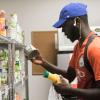How 'Dumpster Diving' Can End Hunger and Food Waste
The Locavore

Photo Credit: Joshua L. Jones
Gracelyn Jones, president of UGA Campus Kitchen, helps prepare a community mean with food collected from Trader Joe’s and other local grocery stores that would be otherwise wasted.
Several summers ago, a friend invited me over for a potluck. I brought a dip. He grilled zucchini and squash—plates and plates of it. The counter was dominated by green and yellow. “So, we’re having squash,” I quipped. “And some tofu,” he said.
I learned later that the veggies and tofu were rescued from the Dumpster behind Earth Fare the day before. That was my introduction to Dumpster diving, the alliterative moniker for retrieving unspoiled foods from grocery-store garbage bins.
Christy Tweedy would love to see the end of Dumpster diving. Not because of the act, but because she believes no food should be wasted. “I would love Athens to be known as having the cleanest Dumpsters,” she says. That’s why she’s now collecting unsold food before it hits the trash.
Tweedy is an AmeriCorps VISTA member with the Athens Community Council on Aging. Last August, the ACCA partnered with UGA’s Campus Kitchen to organize an event raising awareness about food waste and hunger. The star speaker was environmental activist Rob Greenfield, who has used Dumpster diving to help Americans visualize just how much food we throw away. The numbers are shocking: Americans throw away 40 percent of the food they purchase every year. That’s 63 million tons of food. That waste stands in stark contrast to hunger in the U.S. In 2015, Feeding America estimated that 42.2 million Americans were “food insecure”—going hungry or in danger of it.
Hunger was a recurring topic at the August event, and though Greenfield may have been the draw, attendees heard from several local organizations working to reduce food waste and address hunger in our community.
“That was one of the first times that we got together and brought all the different players who have some stake in food recovery around the table,” says Campus Kitchen coordinator Brad Turner. Campus Kitchen is one of several local groups that work with grocery stores to recover food the store can’t sell.
“Campus Kitchen’s general mission is to take food that would otherwise be thrown away and to repurpose the food into new, healthy meals,” Turner says. Most of the food goes to Athens seniors through a partnership with the ACCA’s Senior Hunger Coalition, which identifies clients in need and delivers meals to them.
“They were seeing food waste, and we were seeing people who would definitely need it,” says Sarah Kruse, Grandparents Raising Grandchildren program coordinator.
Senior hunger is a big issue in Athens. According to a survey conducted by UGA’s Food and Nutrition students, 78 percent of GRG’s clients said they don’t have enough food to eat. “That’s terrible,” Kruse says. “We’re talking about seniors and children, two of our most vulnerable populations.”
Many of these families, says Kruse, are struggling to afford fresh, healthy food. All meals provided by Campus Kitchen meet MyPlate.gov standards, so each family gets a balance of vegetables and fruit, protein and grains. And it all comes from food waste. Every Sunday, Campus Kitchen collects 400–1,200 pounds of surplus food from grocery stores. That translates into 15,000 meals each year, using produce, meats, breads and more that would otherwise be shipped to the landfill.
Turner admits the idea carries some stigma. No one wants to think they’re eating garbage. But food recovery advocates are working to correct that attitude: Waste does not mean spoiled or bad, they say. Waste is a symptom of overproduction. Food that has truly gone bad doesn’t make into Turner’s kitchen.
Most of us are confused about when food has gone bad, says Tweedy. “Right now we have ‘best by,’ ‘use by,’ expires by’—it’s confusing,” he says. Congressional Democrats have put forward a bill that would clarify those labels.
Both Campus Kitchen and the ACCA teach students and seniors how to reduce food waste at home, whether that’s through meal planning or understanding that the ugly or bruised fruit is still safe, nutritious and tasty. Tweedy urges all Athenians to help in the larger efforts to keep Athens Dumpsters clean by donating, volunteering and urging your state or U.S. congressperson to support policies that will reduce food waste. Campus Kitchen and the ACCA offer weekly volunteer shifts through GivePulse.com. We can take on food waste, and make Dumpster diving a thing of the past.












comments